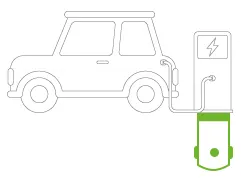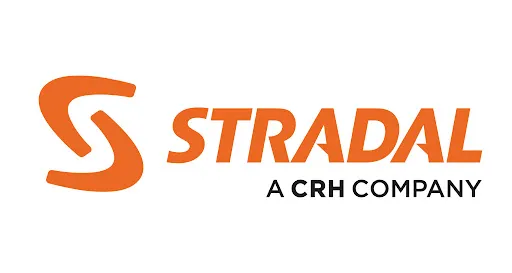Gone are the days when charging an electric car was a time-consuming task. With the advent of fast EV chargers, recharging your vehicle is now as convenient as a quick pit stop. In this comprehensive guide, we’ll dive into the world of fast EV chargers, including DC Fast Charging and Tesla Supercharging, to help you make the most of your electric vehicle experience.
Whether you’re a seasoned EV owner or new to the electric revolution, fast EV chargers have made it easier than ever to keep your vehicle charged and ready for the road ahead. Let’s start by understanding the different types of fast chargers and their benefits.
Key Takeaways
- Fast EV Chargers such as DC Fast Charging and Tesla Supercharging provide faster charging times than Level 1 & 2 chargers.
- Popular electric vehicles have different fast charging times depending on battery capacity, rate & ambient temperature.
- Maximizing the efficiency of fast EV charging includes effective battery temp management and limiting charge to 80%.
Understanding Fast EV Chargers
As electric vehicles gain popularity, charging infrastructure has evolved to keep up with demand. While Level 1 and Level 2 chargers provide a slower charging experience, fast EV chargers like DC Fast Charging and Tesla Supercharging have significantly reduced charging times. These modern chargers bypass the onboard charger, enabling faster charging speeds while being restricted by the vehicle’s battery management system.
Fast chargers prove beneficial not just for long-distance driving but also offer a handy solution for battery top-ups during brief journeys. You might wonder about the functioning of these chargers and their differentiation from the slower ones. Let’s delve into these aspects.
DC Fast Charging
DC Fast Charging, as the name suggests, provides a rapid charging experience by bypassing the onboard charger. This allows for quicker charging times but is limited by the vehicle’s battery management system, which determines the vehicle’s maximum charging rate. With how much power output ranging from 25 kW to 350 kW, DC fast chargers cater to a wide variety of electric vehicles.
However, using DC fast chargers extensively may cause the battery to overheat, leading to reduced longevity, especially when charging a nearly depleted battery. Consequently, striking a balance between swift charging and battery longevity becomes imperative.
DC fast-charging stations, also known as charging station, are ideal for road trips or when a full charge is necessary for extended driving, as they provide the power needed for long distances by efficiently utilizing your car’s onboard charger.
Tesla Supercharging
Tesla has taken fast charging a step further with its proprietary Supercharging network. Capable of charging up to 250 kW per vehicle, Tesla Superchargers provide rapid charging specifically for Tesla models. This high power output ensures that Tesla owners can charge their vehicles quickly and conveniently.
A Tesla vehicle can be charged up to 80% in just around 15 minutes at a Supercharger station, while a full charge may take approximately one hour. This impressive charging speed is a testament to Tesla’s commitment to delivering a seamless electric vehicle experience for its customers.
Charging Standards and Connectors
Charging standards and connectors play a vital role in ensuring compatibility across different electric vehicles and charging stations. Some of the most commonly used standards and connectors include CHAdeMO, CCS Combo, and Tesla connectors.
CHAdeMO, developed by the CHAdeMO Association, is the most widely used DC fast charging standard globally. On the other hand, the SAE CCS Combo standard, developed by the Society of Automotive Engineers (SAE), combines two charging connectors for AC and DC fast charging.
Tesla has its exclusive charging standard, which is a combination of two connectors for its vehicles. These varying standards ensure that electric vehicle owners can access compatible charging stations for their cars.
Fast Charging Times for Popular Electric Vehicles
Having delved into the realm of fast EV chargers, we can now examine the charging duration for some popular electric vehicles, namely the Nissan Leaf, Chevrolet Bolt, and Tesla Model 3.
Charging times for these vehicles depend on factors such as battery capacity, charging rate, and ambient temperature.
Nissan Leaf
The Nissan Leaf, a popular electric vehicle choice among consumers, has a charging time that varies depending on the battery size and charging method. A DC fast charger can charge a Nissan Leaf up to 80% in approximately 40 minutes.
For those with a 62 kWh battery, a full charge would take around 11.5 hours, while a 40 kWh battery would require approximately 8 hours for a complete charge. With a DC fast charger, the Nissan Leaf provides a convenient and efficient electric vehicle experience, making many wonder how long does it take to charge in various scenarios.
Tesla Model 3
Tesla Model 3, a popular choice among electric vehicle enthusiasts, has a charging time that depends on the battery size, charging rate, and ambient temperature. When using a Tesla Supercharger, the Model 3 can be charged up to 80% in approximately 20 minutes.
Charging times for the Tesla Model 3 vary based on the charging method used. Here are some examples:
- Using a 120-volt outlet provides approximately 2 to 3 miles of range per hour of charge.
- Using a 240-volt outlet provides approximately 10 to 20 miles of range per hour of charge.
- Using a Tesla Supercharger can provide up to 170 miles of range in just 30 minutes.
With the convenience of Tesla Superchargers, Model 3 owners can enjoy the benefits of fast charging and an outstanding electric vehicle experience.
Planning Road Trips with Fast Chargers
Embarking on a road trip with an electric vehicle requires some planning to ensure a smooth and enjoyable journey. One of the crucial aspects of planning is locating charging stations along your route and factoring in charging times. Online resources like PlugShare or ChargeHub can help you identify charging stations along your route, making it easier to plan your stops.
Further, maintaining the battery at optimal levels during your journey is also of prime importance. It’s recommended to charge from approximately 10% to 80% during each stop, as charging to 100% will add considerable time to the charging session. By following these tips, you can make the most of your road trip with fast chargers, ensuring a seamless electric vehicle experience.
Maximizing Fast Charging Efficiency
For maximizing the benefits of fast EV charging, effective management of battery temperature is necessary. It is also advisable to limit charging up to 80% as charging speed reduces as the battery approaches full capacity.
Let’s delve deeper into these aspects of maximizing fast charging efficiency.
Battery Temperature Management
Efficient fast charging relies on optimal battery temperature management, as extreme temperatures can significantly affect charging speed. For an optimal charging experience, it is important to maintain the battery’s coolness, possible through a cooling system like a fan or air conditioning.
Moreover, it’s recommended to avoid charging the battery in direct sunlight or in hot environments. By effectively managing battery temperature during fast charging, you can enjoy faster charging times, extended battery life, and enhanced safety.
Charging to 80%
To charge an electric car efficiently, it is recommended to charge your electric vehicle up to 80% to help maintain faster charging rates, as charging speed decreases when the battery is close to full. Limiting the charge to 80% capacity also helps prolong the battery’s lifespan, ensuring a better electric vehicle experience overall.
Adhering to these best practices will enhance fast charging efficiency and allow you to relish the ease of electric vehicle ownership without endangering battery health.
Future Developments in Fast EV Charging
With technological advancements, the realm of fast EV charging and EV battery technology is also bound to evolve. Anticipated developments encompass higher power chargers and Vehicle-to-Grid (V2G) technology, set to radically transform our electric vehicle charging methods.
Let’s delve into these thrilling advancements in more detail.
Higher Power Chargers
Higher power chargers are devices capable of providing higher power levels than conventional chargers, enabling even faster charging times for electric vehicles. The benefits of using higher power chargers include decreased charging times and more dependable charging experiences, as they are less prone to power fluctuations.
As research continues and higher power chargers become more widely available, we can expect even quicker charging times and more accessible charging experiences in the future. These advancements, combined with the potential integration of Vehicle-to-Grid (V2G) technology, paint a promising picture for the future of electric vehicle charging.
Vehicle-to-Grid (V2G) Technology
Vehicle-to-Grid (V2G) technology enables electric vehicles to:
- Supply power back to the grid
- Potentially support grid stability and renewable energy integration
- Utilize car batteries for supplying energy to the power grid
- Transform electric vehicles into mobile energy storage units.
The potential advantages of V2G technology include bolstering grid stability and facilitating the integration of renewable energy sources. As electric vehicles become increasingly prevalent, the implementation of V2G technology could play a significant role in reshaping our energy landscape.
Summary
In conclusion, fast EV chargers like DC Fast Charging and Tesla Supercharging have revolutionized the electric vehicle experience by significantly reducing charging times. By understanding the different types of fast chargers and their benefits, electric vehicle owners can maximize charging efficiency and enjoy a convenient, eco-friendly driving experience.
As we look to the future, developments in higher power chargers and Vehicle-to-Grid (V2G) technology promise to further enhance the electric vehicle charging landscape. With these exciting advancements on the horizon, there’s never been a better time to embrace the convenience and sustainability of electric vehicle ownership.
Frequently Asked Questions
What is the fastest EV charging?
The fastest EV charging available is from ABB’s Terra 360 charger with its ability to fully charge EVs in less than 15 minutes, providing 100km of range in under 3 minutes. Lucid Air and Kia EV6/ Hyundai Ioniq 5 also offer fast charging at 350 kW, allowing an EV to be charged in 15-18 minutes.
Who has the most fast charging stations?
Tesla has the most fast charging stations in the United States, with over 40,000 Superchargers across the globe and the ability to add up to 200 miles in 15 minutes.
How long does it take to charge an EV car at a charging station?
Charging an EV can take anywhere from 20 minutes to 40 hours, depending on the size of the battery and the speed of the charging station. On average, you can expect to charge your battery to around 80% in about 20-40 minutes.
What are the differences between DC Fast Charging and Tesla Supercharging?
DC Fast Charging is a type of fast charging available to most electric vehicles, while Tesla Supercharging is exclusive to Tesla vehicles and offers even faster charging speeds.
How can I find charging stations along my road trip route?
Utilize online resources such as PlugShare or ChargeHub to easily find charging stations along your road trip route.
Read more
Universal design pedestal as charging post
Differences Between Residential and Commercial EV Charging Solutions





